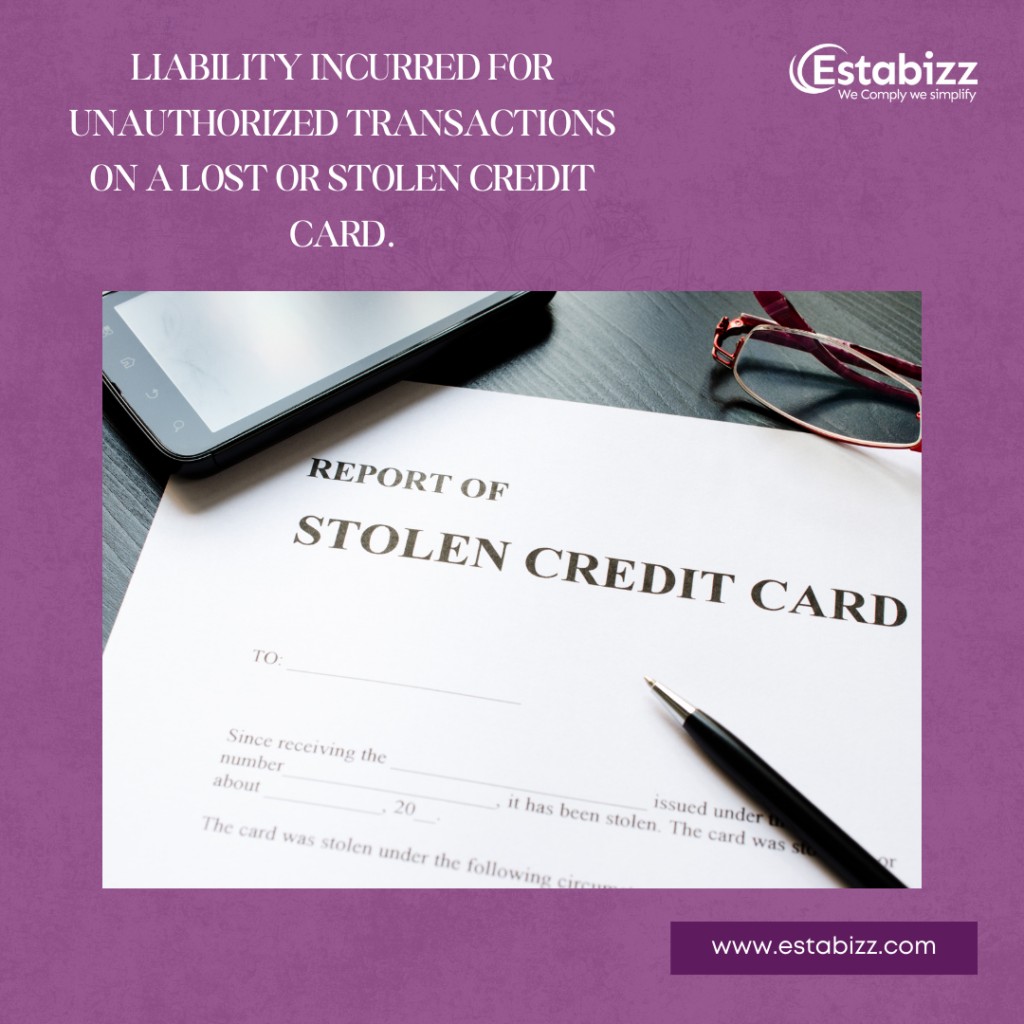Understanding Lost Credit Card Liability: An Essential Guide
In an increasingly digital world, the loss of a credit card continues to be a pressing concern for many. Have you ever wondered what to do if you lost your credit card and noticed unauthorized transactions before you could report it? This guide aims to shed light on the concept of lost card liability and equip you with the knowledge to handle such scenarios effectively.
What is Lost Card Liability?
Lost card liability refers to the financial responsibility a credit cardholder faces following unauthorized transactions made on a lost or stolen credit card. Governed by the Reserve Bank of India (RBI) regulations, this liability varies based on when the cardholder reports the loss to their bank.
Key Points:
- Definition: Liability incurred for unauthorized transactions on a lost or stolen credit card.
- RBI Guidelines: Different levels of liability based on reporting timeframe.

Liability Based on Reporting Timeframe
1. Reporting within 3 Days:
The cardholder bears no liability if the loss is reported within three days of the incident.
2. Reporting within 4 to 7 Days:
Liability is capped based on the type of card:
- ₹10,000 for basic or standard credit cards.
- ₹25,000 for premium cards such as platinum or signature cards.
Full Liability
If the cardholder fails to report the loss within seven working days, they may be responsible for the entire amount of the unauthorized transactions. The extent of liability increases based on both the delay in reporting and the level of negligence by the customer.
Factors Influencing Full Liability:
- Timeframe: Delay in reporting.
- Negligence: Nature and extent of the cardholder’s negligence.
Importance of Immediate Reporting for Lost Credit Card
Immediate Action: The cardholder should report the loss or theft of the credit card to the bank immediately through customer care or other provided channels such as SMS or mobile app.
Bank Specific Policies: Different banks may have nuanced policies regarding lost card liability. It’s crucial for cardholders to familiarize themselves with their specific bank’s terms and conditions.
Steps to Take:
- Report immediately through official bank channels.
- Understand your bank’s specific liability policy.

The Role of RBI Framework
The RBI regulations aim to safeguard consumers from financial losses arising out of unauthorized transactions. However, the efficacy of this protection hinges on prompt reporting by the cardholder to minimize risks.
Summary of Key Takeaways:
- Act swiftly to report a lost or stolen card.
- Understand your bank’s policies and the RBI guidelines.
- Prompt reporting can significantly reduce or even eliminate your financial liability.
Recent Trends and Insights
The digital transformation in banking has led to increased security measures, yet the risk of card loss remains. With an uptick in contactless and online transactions, understanding lost card liability is more pertinent than ever. Banks are continually enhancing their policies to provide better protection, and it is advisable for cardholders to stay informed about these developments.
Enhancing Your Understanding: Additional Considerations for Lost Credit Card Liability
Having covered the foundational aspects of lost card liability, let’s delve deeper into additional considerations that can further empower you as a credit cardholder.
Enhancements in Security Measures
Technological Advancements:
- Banks are integrating cutting-edge technology to enhance security.
- Examples include secure chips, OTP (One-Time Password) verification for transactions, and real-time transaction alerts.
Global Trends:
- Advances in artificial intelligence and machine learning are employed to detect fraudulent activities. Banks across the globe are adopting these technologies to safeguard against unauthorized transactions.
Preventive Strategies
Best Practices for Cardholders:
- Always keep your credit card in a secure location.
- Regularly monitor your transaction statements for any discrepancies.
- Enable transaction alerts to receive instant notifications of card usage.
- Avoid sharing your credit card details online or over the phone unless absolutely necessary.
Bank-Specific Policies and Consumer Rights
Understand Your Rights:
- Familiarize yourself with consumer protection laws related to financial transactions.
- Know the specific liability policies of your bank as they may have additional provisions beyond RBI’s regulations.
Additional Protective Measures:
- Some banks offer insurance coverage for lost cards. Investigate if this optional coverage is available and beneficial for you.
- Enroll in services that offer continuous monitoring of suspicious activities.
Case Studies and Real-World Scenarios
Case Study 1:
- A small business owner in Mumbai promptly reported a lost credit card within 24 hours and incurred no liability for the subsequent unauthorized transactions thanks to adherence to RBI guidelines.
Case Study 2:
- Alternatively, another cardholder failed to report the loss within the stipulated time and faced full liability, highlighting the importance of immediate action.
Stay Informed and Proactive
Continuous Education:
- Regularly update yourself on changes in financial regulations and bank policies.
- Participate in educational seminars or webinars offered by financial institutions to stay ahead.
Global Best Practices:
- Learn from global best practices and implement them to enhance your financial security.
- Leverage the global expertise of Estabizz Fintech to navigate international financial environments confidently.
Estabizz Fintech’s Global Reach and Expertise
Empowering Your Business:
- Estabizz provides local expertise in numerous countries, ensuring your business remains compliant with financial regulations wherever you operate.
- Our support encompasses various aspects of financial compliance, business growth strategies, and risk management.
Partner with Estabizz:
- With Estabizz’s comprehensive and supportive approach, you can be confident in overcoming any financial challenges.
- We stand ready to assist you in achieving your business goals on a global stage.
Key Takeaways
- Immediate Reporting: Report lost or stolen cards promptly to minimize liability.
- Technological Integration: Utilize advanced security measures offered by banks.
- Understand Policies: Familiarize yourself with both RBI guidelines and bank-specific policies.
- Best Practices: Adopt preventive measures for better financial security.
- Stay Educated: Regularly update your knowledge on financial compliance and security trends.
Conclusion
Navigating the complexities of lost card liability requires awareness and proactive action. By understanding the guidelines, leveraging advanced security measures, and adopting best practices, you can protect yourself from unauthorized transactions and financial loss. At Estabizz Fintech, we extend our global expertise to support you in achieving your financial stability and growth objectives, ensuring you navigate international financial landscapes with ease and confidence.
Estabizz Fintech compiled the material in this article using the most recent Acts, Rules, Circulars, Notifications, Provisions, Press Releases, and material applicable at the time. They ensured the completeness and correctness of the material through due diligence. When using this material, users must consult the relevant, applicable legislation. The given data may change without prior notice and does not constitute professional advice. Estabizz Fintech disclaims all liability for any results from the use of this material.




